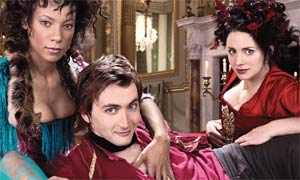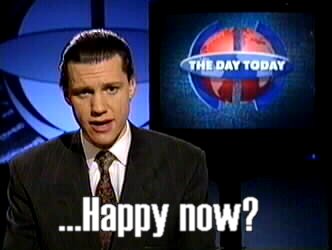March 30, 2005
Ridicule is nothing to be scared of
 |  |
The ridiculous is not the opposite of the sublime, but its twin. The real opposite of the sublime is, of course, the intransigently banal and commonsensical.
Smug detachment is the required postmodern pose, because, on a psychological level, postmodernism is driven above all by the fear of looking silly, of being seen to be taking something - which the big Other might turn out to deem as ridiculous - seriously. The pomonaut is so depressively flat because he is well aware that there is nothing that can in principle escape this judgement. Conspicuously cultivated ironic distantiation, the flaunting of lack of commitment, is thus the only possible option. (Which is why Luke was right to celebrate Brian Sewell and Tim Westwood a while back, since they are quite the opposite: people who have the courage to be committed, no matter how silly they may be considered by others.)
One of the great things about Russell T Davies is his precisely his willingness to risk ridicule. His treatments of Casanova and Dr Who have shown that it is possible to be serious without being po-faced, and humorous without being pomo-faced. Davies has the courage to be both queer (rather than gay) and a geek. There is a particularly strong relationship between camp and postmodernity, just as there is an affinity between glam and queer. Postmodern camp takes refuge in neurotic hedonism as the safest of all options (no one is going to mock you for pursuing pleasure, surely). Glam, on the other hand, risks taking - itself and 'things' - too seriously. You might find yourself on endless re-run on future editions of I Heart 2005, being mocked by the likes of Paul Ross. But postmodern camp has a vampiric relationship to the ridiculous - whilst viciously ensuring that the cultural and psychological conditions obtain which mean that there can be nothing new produced which might, possibly, be thought of as ridiculous - it nevertheless is in a parasitic relationship to previous forms of the ridiculous. The familiar strategy of raised eyebrows and quotation marks are the means by which the camp pomonaut can live out this bad faith, endlessly lip synching to Abba whilst laughing off stage any contemporary band that displayed their daring ingenuousness.
The political question concerns what escapes ridicule. This occurred to me while flicking through a newspaper in one of our local Eurabian cafes (Eurabian cafes being the superior alternative to American franchise coffee bars round here, of course - I for one would rather live in Eurabia than Gilead). I'd just read the Dr Who reviews, which, like most reviews, are depressing even when they are positive, depressing because they imply that there is this place of neutral uncommitment from which judgement can be passed. The role of a newspaper TV reviewer (leaving Charlie Brooker out of this for the moment) is now to be a mouthpiece for the big Other: there is so much 'contextualization', i.e. conjectures as to what the big O might possibly think, before the judgement is timorously passed. I read only two Dr Who reviews, and both reviewers bent over backwards to establish that IN NO WAY could they be conceived of as Dr Who fans, never watched it before, good god, no, even as children they messy-haired faux-self-deprecating meeja gunslingers in waiting....
But it was the contrast between the grudging, yes, it's a little bit ridiculous but we can allow it throughnow reception of Dr Who and this column that struck me. (btw Can there really be an advertising journalist really called 'Wnek' who is not the invention of Chris Morris?) In some ways, it is unfair to pick on one column; it is not as if this is more absurd than anything else in the media-on-media genre (the lowest, the absolute lowest, circle of hell is occupied by media-on-media journalists). But the point is, how are we in a world where a sentence such as 'when WCRS won the £22m Abbey pitch against incumbent TBWA and the agency I thought would walk it, the resurgent Lowe London' does not only invite corruscating ridicule but also rage?
In many ways, one of the most disappointing things about Nathan Barley was that it - deliberately - missed the opportunity to ridicule that world. Morris and Brooker were so keen to avoid the 'Hoxton satire' label that, for all its strengths, Barley will never rank with Morris' other achievements. In an email interview with the Sunday Times this week, Morris attempted to position Barley as a 'sitcom' as opposed to a 'satire':
"A sitcom isn't usually the right tool for satire ... When you watched I'm Alan Partridge, did you really go, 'Thank God they're exploding the hideous world of the local-radio DJ in temporary accommodation'? Or The Office, 'At last someone's rodding the paper merchants!'"
It's not that there isn't any truth in Morris' remarks. You only have to remember the appalling 'award-winning' Drop the Dead Donkey (the only description more delibidinizing than 'award-winning' being 'based on a true story' of course) to recognize that.

But it is the focus on I'm Alan Partridge rather than Knowing Me, Knowing You that is so telling. As Sphaleotas has argued, I'm Alan Partridge was conservative precisely because it was no longer about the structures of light entertainment but the pathological proclivities of a middle-aged man.
On the other hand, it is not as if The Office WAS purely about Brent's pathologies. On the contrary, the show really started to lose it when it did become solely about Brent's absurdities. As soon as the smugoisie 'Good Manager' - who really CAN good humouredly get along with the staff and 'let his hair down' (but only, naturally, at 'appropriate' times) - arrived from Swindon, the series lost all its bite. It then implied that Friendly Managerialism wasn't innately pernicious and that it is individuals, not the structure of management itself, that are the problem.
Similarly, the problem with Nathan Barley is that Barley is too sympathetic, because too obviously ludicrous. This implies that it is possible to be in nu-meeja/advertising/branding without being infected by their inherent stupefying inanity. It is not the desperate-to-please Barley who should be laughed at (precisely because, in the end, he is well aware of the possibility of ridicule), but people who can smugly talk about 22m advertising pitches as if this and the world they belong to, the world of postmodernity in person, is not in fact, the worst of all words, being both ridiculous AND banal.
_________________________________________________________________
While we're on Russell T... if it is true that Eccleston is leaving Dr Who after one series (proof once again of the inherent evil of actors - I can't think of how many actors 'not wanting to be typecast' blighted my childhood - I take the Kubrick view: yr just a machine part, Mr Actor, live with it), please let it be true that the BBC are talking to David Tenant, the lead in Davies' Casanova. Tenant has a lightness that doesn't come naturally to Eccleston and would be excellent - if, that is, he can contain the egocentrism that is the bane of his profession.
Posted by mark at March 30, 2005 02:23 PM | TrackBack